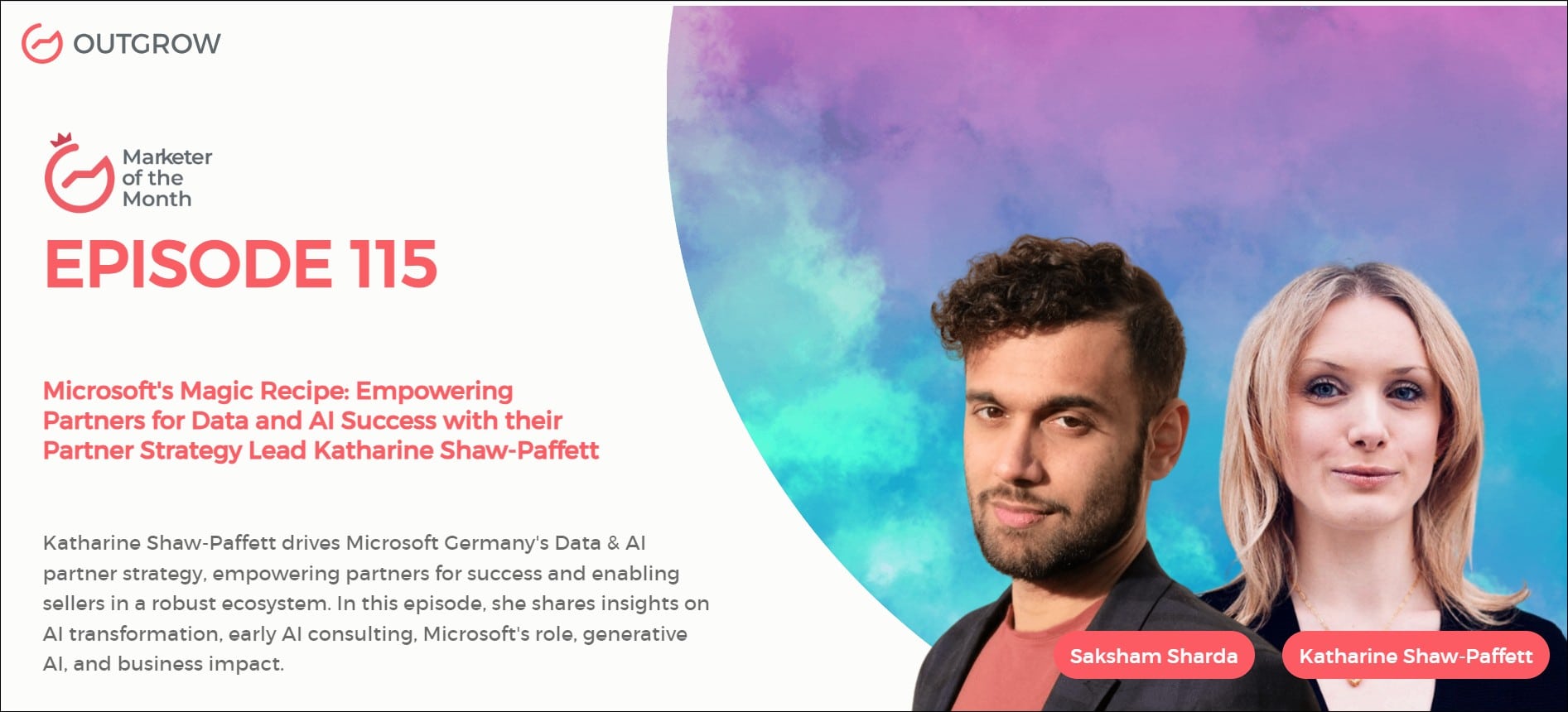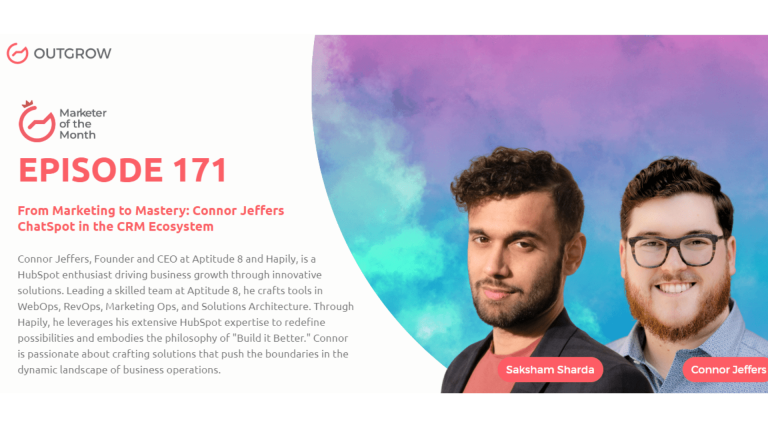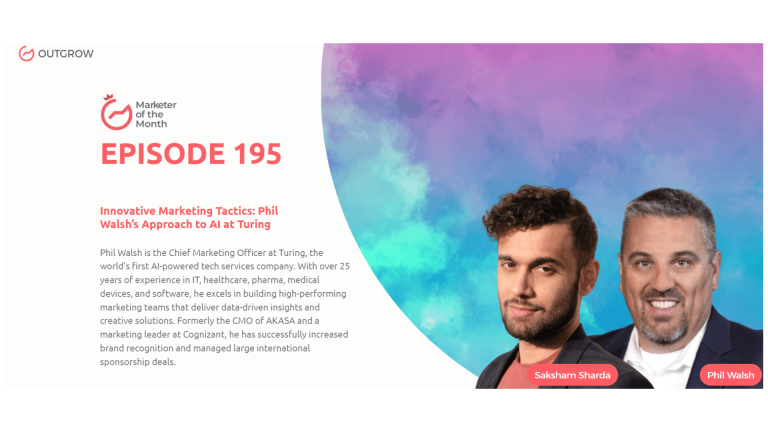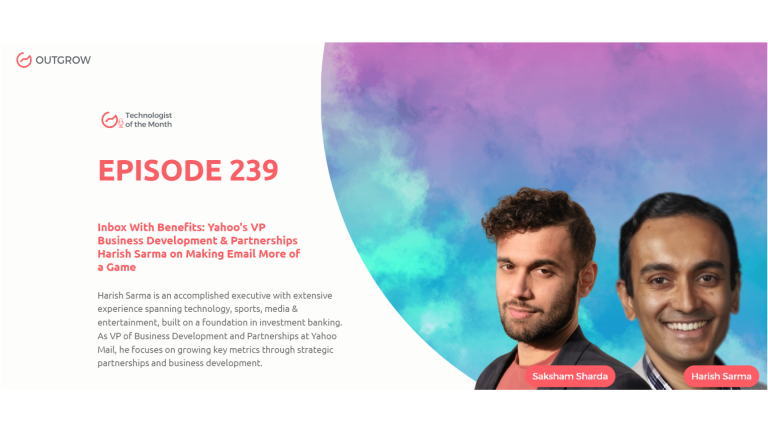Summarize with :
EPISODE 115: Marketer of the Month Podcast with Katharine Shaw-Paffett
Table of Contents
Hey there! Welcome to the Marketer Of The Month blog!
We recently interviewed Katharine Shaw-Paffett for our monthly podcast – ‘Marketer of the Month’! We had some amazing insightful conversations with Katharine and here’s what we discussed about –
1. The potential of AI in transforming organizations and processes
2. Consulting and transformation: Early career insights in AI
3. Microsoft role: Empowering partners and managing the ecosystem
4. The paradigm shift: Embracing generative AI’s agent relationship
5. Velocity at MWC: Empowering partners to launch MVPs faster
6. AI’s impact on businesses: Synthesis and effective audience connection
About our host:
Dr. Saksham Sharda is the Chief Information Officer at Outgrow.co. He specializes in data collection, analysis, filtering, and transfer by means of widgets and applets. Interactive, cultural, and trending widgets designed by him have been featured on TrendHunter, Alibaba, ProductHunt, New York Marketing Association, FactoryBerlin, Digimarcon Silicon Valley, and at The European Affiliate Summit.
About our guest:
Katharine Shaw-Paffett drives Microsoft Germany’s Data & AI partner strategy, empowering partners for success and enabling sellers in a robust ecosystem. In this episode, she shares insights on AI transformation, early AI consulting, Microsoft’s role, generative AI, and business impact.
Microsoft’s Magic Recipe: Empowering Partners for Data and AI Success With Their Partner Strategy Lead Katharine Shaw-Paffett
The Intro!
Saksham Sharda: Hi, everyone. Welcome to another episode of Outgrow’s Marketer of the Month. I’m your host, Dr. Saksham Sharda, and I’m the creative director at Outgrow. co. And for this month we are going to interview Katharine Shaw-Paffett, who is the Partner Strategy Lead for Data & AI at Microsoft. Thanks for joining us, Katharine.
Katharine Shaw-Paffett: Great to be here. Thank you.
Don’t have time to read? No problem, just watch the Podcast!
Or you can just listen to it on Spotify!
The Rapid Fire Round!
Saksham Sharda: So we’re gonna start with the rapid-fire round. The first one was, At what age do you want to retire?
Katharine Shaw-Paffett: I never want to retire.
Saksham Sharda: What’s your favorite mobile app?
Katharine Shaw-Paffett: Spotify.
Saksham Sharda: How long does it take you to get ready in the mornings?
Katharine Shaw-Paffett: 45 minutes.
Saksham Sharda: The most embarrassing moment of your life.
Katharine Shaw-Paffett: There’s been a couple.
Saksham Sharda: Mountains or beaches?
Katharine Shaw-Paffett: Beaches
Saksham Sharda: What’s the most useful mobile feature you can’t live with?
Katharine Shaw-Paffett: Uber
Saksham Sharda: Favorite color?
Katharine Shaw-Paffett: Black.
Saksham Sharda: What time of day are you most inspired?
Katharine Shaw-Paffett: Mornings.
Saksham Sharda: How many hours of sleep can you survive on?
Katharine Shaw-Paffett: Two.
Saksham Sharda: Fill in the blank- And upcoming AI trend is _____
Katharine Shaw-Paffett: As in an adjective or that like something like generative AI.
Saksham Sharda: Or maybe an upcoming marketing trend is _____
Katharine Shaw-Paffett: Okay, generative AI.
Saksham Sharda: The city in which the Best Kiss of your life happened.
Katharine Shaw-Paffett: Pass that question.
Saksham Sharda: Android or Apple.
Katharine Shaw-Paffett: Apple
Saksham Sharda: The biggest mistake of your career?
Katharine Shaw-Paffett: I don’t have anything I learned from my mistakes. So I never regret anything. I just learned from my mistakes.
Saksham Sharda: How do you relax?
Katharine Shaw-Paffett: I run.
Saksham Sharda: How many cups of coffee do you drink per day?
Katharine Shaw-Paffett: I used to drink about 10 espressos but I’ve tried to cut it down now to five.
Saksham Sharda: A habit of yours that you hate?
Katharine Shaw-Paffett: Procrastination
Saksham Sharda: The most valuable skill you have learned.
Katharine Shaw-Paffett: Discipline.
Saksham Sharda: Cities or countryside.
Katharine Shaw-Paffett: City.
Saksham Sharda: And the last one is your favorite Netflix show.
Katharine Shaw-Paffett: I don’t watch Netflix. I watch Amazon Prime. So then it would be the grantor.
The Big Questions!
Saksham Sharda: Alright, so let’s go on to the bigger questions which you can answer with as much ease and length. Okay. What led you to pursue a career in the field of AI and what excites you most about the industry today?
Katharine Shaw-Paffett: Okay, so this will be a long answer. I hope you’ve got time. So in 2014, so nearly 10 years ago, I went to the Mobile World Congress. And at that time, I was working in wireless as an intern at Gordon Schwartz. So they’ve got a stand here in Hall Five. I went to visit them yesterday. And I always think of tech as a kind of social cement. Everyone’s coming together with I would say one goal to enable people in organizations, with the best technology possible, so they can do more. At least that’s very much in our corporate philosophy in mind. And I remember this was in 2014. And people were wearing Google Glass in the underground. And I was so inspired by the Mobile World Congress. I did start looking after I finished my degree in this internship, I did start looking for roles and transformation, as also technology. So I started consulting, at Ernst and Young, in m&a, because mergers and acquisitions, it’s obviously all about transformation. And I was very keen to transform organizations and processes. And I remember writing due diligence, and it was an operational due diligence, and looking at its part, I started getting very fascinated about how they were fusing these two IT systems of the insurance at the time together. So that also sparked my interest. And then a couple of years on EY in 2016. I was very fortunate to work on an intelligent Wealth Management Act and this was very pioneering because back in the day, there weren’t actually that many in the market. And it just showed me what was possible: you could tailor an offering to a particular demographic with not even a person behind it, but intelligence and it showed me what was possible. So I then moved to Accenture where I did IT consulting. And again, actually going back to my career EY also rolled out GDPR. So, with this portfolio project, I started to see the, I would say combination of data. So I always say the cloud is the enabler. I heard this from Accenture, actually, but the cloud as the enabler of data is the driver, and AI is a differentiator. Yeah. So once you’ve modernized your cloud platform, it’s in the cloud. Once you’ve got a sound enterprise data warehouse and data quality and data governance strategy in place, then you can start differentiating your business with AI. And that excited me. So I started doing IT consulting at Accenture. And yeah, that was very exciting, I was doing more of the same thing. And then during the pandemic, I started interviewing with Microsoft. And they had a strategic role in data and AI that was going and I felt it was all of the paths my career has taken so fast. So far, it was fusing all of them. So now I very much take care of our partner ecosystem for Germany, both on the migrating and modernizing side, as well as this innovation and enablement side and also how we can defend our business. So that was basically in a nutshell how I got excited about AI. So it all started at the Mobile World Congress nearly 10 years ago. And then through my various projects in consulting, I started Yeah, I would say tying all the paths together until I ended up here. Yeah, but the Mobile World Congress is very much to thank for sparking that initial interest.
Saksham Sharda: Alright, so the next one is, we all know chatGPT is very much on trend nowadays. How do you see AI evolving in the next five or 10 years? And what impact do you think that will have on our daily lives?
Katharine Shaw-Paffett: Amazing question. So I’m a huge fan of Satya Nadella. And I’m sure that you and most of our viewers watched his speech two weeks ago now, where he talked about the three platform shifts on the web. Yeah. So you started, you said that the web started? Yeah. on PCs. Then it moved to mobile and cloud. And now it’s moved to generative AI. And he talked very much. First of all, what is generative AI? It’s when new content and output are generated by AI that has not been programmed into the system, just to make sure we’re clear on the definition. And he said that this was a third platform shift. And I believe it is, I believe that it’s a paradigm shift. And I believe that we’re going to have a kind of agent relationship going forward. So as he also said, we will have a kind of co-pilot. So you’ll see that now that we have a ChatGPT integrated into Bing. And we’re very much an AI company. So I see that in everything we do going forward. And I think it’s necessary. I remember talking to some friends of mine a while ago, and my friend asked me how many emails I get a day. And I asked him how many emails he gets a day. Yeah. And he said 100 plus. And if we carry on growing how we’re growing now, I mean, look at ChatGPT in a couple of months, they had 100 million users. We didn’t even see that with Netflix. Yeah. This rate of growth. I don’t think it’s possible to scale or be sustainable without a little bit of help. Now, there’s something called Moore’s law, which says that computational progress doubles every couple of years. Do you look at chat GPT with 100 million users in a couple of months? What kind of rate of growth I mean, that’s exorbitant, I don’t think we can keep up with a scale of growth unless we have a bit of help. So as I said, this, this, this agent relationship that Sacha talked about a couple of weeks ago now, I think is going to be very present. I also think with regards to health, I think that can revolutionize our health system. So with regards to patient monitoring and understaffing, I think it can do a huge amount there. And also, if you think about the way, for instance, chat GPT works, and how doctors do diagnosis is Yeah, open AI can scan all of those databases in a much shorter span, which can speed up a diagnosis, for instance, and can even save lives. So I say, being pivotal going forward, I also see it as being necessary going forward.
Saksham Sharda: What does this year’s MWC theme of velocity mean for you in that regard? And also for the market?
Katharine Shaw-Paffett: Wonderful question. What does it mean for me? So I can talk a little bit about my role at Microsoft now. So I always say I have a couple of goals in my job. And one of them is very much to empower our partners to get into the market as fast as possible and in the best possible way. Because going back to, for instance, Moore’s law, or the scale of growth we’ve seen in AI, I mean, the compound annual growth ratio for AI also went up a couple of notches. After the ChatGPT was released, Open AI was released. I think this is the scale of growth, that requires ecosystem economies and requires companies to be very fast. So I find it a very pragmatic theme from the Mobile World Congress to have velocity because I think that’s the only way that we can compound this market growth. And I also think it’s not just about being fast, but it’s also about ecosystems. So I don’t think it’s possible. Most of us companies are now certainly in the tech industry, we’ve seen it over the last couple of weeks. We have a flat headcount. Yeah, most of us right now. And you can’t scale in a market. Yeah, I would say, to a sufficient extent, the extent with it with a flat headcount. And so, partnerships there become very important. So this is the theme of velocity at MWC. I always think that the best possible way to scale is with partners.
Saksham Sharda: The next one is you describe the part of your job role as empowering people to make mistakes. Can you elaborate further on that?
Katharine Shaw-Paffett: Yes, of course. So I would say, in this market, I’ve talked about the rate that the market is growing. So whether it’s the compound annual growth ratios for AI that have, for instance, as I said, gone up a couple of notches, since the opening, I buzz started since that paradigm shift started. But also going back to Moore’s law. I think it’s, I don’t think we can focus on perfectionism anymore. So I think whereas before you built a product, yeah, let’s say 10 years ago, and you wanted it to be perfect before you expose it to the market. I don’t think we have time. And I don’t think we will get sufficient feedback if we launch the product when it’s perfect. So my philosophy is very much that I enable our partners at Microsoft, and our sellers, to even meet mistakes. So to fund that MVP that they want to push out into the market so they can expose it to end-user feedback. So we can then take it back, and then perfect it and release it again as a second MVP, and actually put together a premium product that meets market demand. That’s what I mean by empowering people to make mistakes that I really put our partners and our segments at Microsoft in a position where they can, for instance, roll out an MVP, that’s perhaps not perfect, but then expose it to end-user feedback, which should then refine the product.
Let’s Conclude!
Saksham Sharda: Thanks, everyone for joining us for this month’s episode of Outgrow’s Marketer of the Month. That was Katharine Shaw-Paffett, Partner Strategy Lead for Data & AI at Microsoft. Thanks for joining us, Katharine.
Katharine Shaw-Paffett: Pleasure. Thanks for having me.
Saksham Sharda: Check out the website for more details and we’ll see you once again next month with another marketer of the month.









